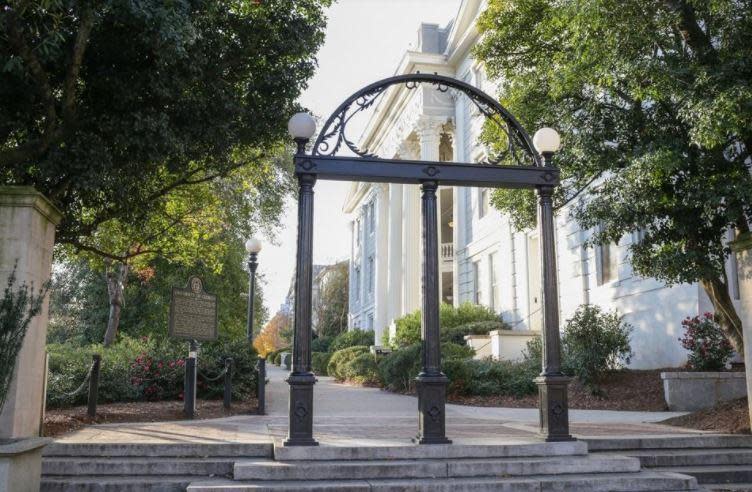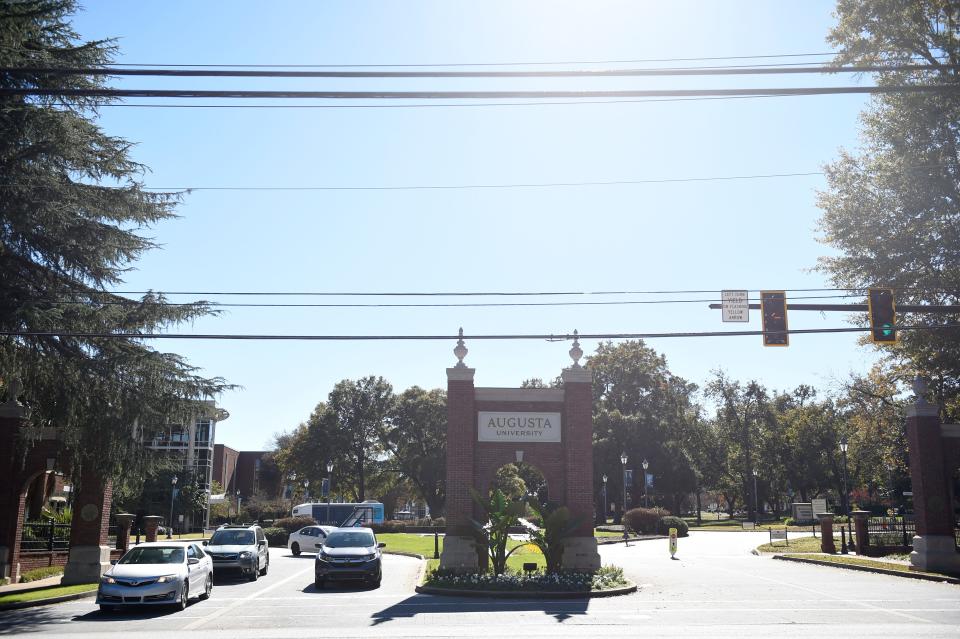Enrollment drops could mean cuts at some Georgia colleges; UGA and AU see growth

University System of Georgia Chancellor Sonny Perdue recently laid out a potentially challenging future for public higher education in Georgia.
During a presentation last week to lawmakers considering the state budget, Perdue said education is getting more expensive while enrollment is dropping. Enrollment in the fall across all of USG was down 1.8% over the year prior, and it will likely continue to fall as the number of students coming up through high school is smaller.
"It's not going to get any better for the next couple years either. This is not just going to turn and pivot," Perdue told the legislators. "This demographic cliff that we're facing is serious, and it's going to be with us."
Perdue's warning:Perdue warns enrollment declines at University System of Georgia will mean funding cuts
Big budget:Georgia Gov. Brian Kemp proposes record $32.5 billion state budget
Perdue said that institutions are doing a great job of trying to balance rising costs and falling enrollments, which also determines state funding. Of all the USG institutions, 20 saw a drop in funding under the Fiscal Year 2024 funding formula; just six saw an increase.
"You can do more with less for a long time, until you do less with less, and that's the challenge that we have here is in determining where that point is as we go forward," Perdue said.
For faculty, it is an uncomfortable time, according to Matthew Boedy, president of the Georgia American Association of University Professors and an associate professor of rhetoric and composition at the University of North Georgia.
"I don't discount the enrollment numbers. There's not much we can do about that and we all knew this cliff was coming," Boedy said. "How long it lasts? We don't really know. But as Chancellor Perdue pointed out, some of our schools are not just surviving, they are thriving. So what can we do to help the rest of us?"
Some institutions avoid the drop
Even with a nearly 2% decline in enrollment across the system, some institutions bucked the trend, including three of the four research universities.
Augusta University has managed to increase its enrollment over the past year by 2.2%, according to USG. University of Georgia grew enrollment by 1.4% and Georgia Tech by 3.3%. Georgia State saw a decline of 0.7%.
All but Georgia State would see increased funding under the proposed formula. UGA, at least, has also continued to increase its research spending — a total of of $545.6 million from a wide array of funders in Fiscal Year 2022, according to a news release.
“The University of Georgia’s academic reputation is steadily on the rise, now ranking 16th among the nation’s public universities, and we are currently ranked second in the country for the best quality of student life," wrote UGA spokesperson Greg Trevor in a statement. "These factors, combined with excellent return on investment for the value of a UGA degree and career placement opportunities, confirm why demand for a UGA education has never been greater."
But Trevor also wrote that UGA is not the only good option for students in the state.
"Students in this state are fortunate to have many excellent choices for public higher education available to them through the University System of Georgia," he wrote. "We encourage prospective applicants to consider the attributes of all USG colleges and universities to determine which is the best school for them.”

Augusta University is also growing steadily.
"I think this was actually our seventh straight year of an increase," said Augusta University Provost Neil MacKinnon. "We're kind of defying the trends, because the majority of universities in this state have declining enrollment. And, again, that's similar to what's going on nationally."
MacKinnon said that AU has been particularly intentional about growing its student body in recent years, after President Brooks Keel set a goal of increasing enrollment to 16,000 students by 2030; current enrollment is about 9,800.
"A lot of work has gone into what we call a strategic enrollment management plan," MacKinnon said. "It's our university's first strategic enrollment management plan. It was released last spring, after about a year of working into it. And that maps out year by year, between now and 2030, each college, each program, each degree, kind of where we're expecting the growth to happen."
MacKinnon said not all the institutions in USG have a plan. Of those that do, some may not be able to implement them, especially with falling revenues that come with declining enrollments. Augusta University, though, has been able to follow through, especially with its new online program.
"That launches this coming fall, with our first three degree programs, and our goal is to launch 25 degree programs within the next five years," he said. "And so if you look at our growth, certainly we're going to grow traditional students, you know, on campus here in Augusta, but also extending our reach across the state and even beyond Georgia, in particular to attract adult learners."
Augusta University is also growing its nursing and medical programs, and the College of Education and Human Development has grown to the largest in the university, largely through online masters programs for teachers across the state. A majority of students now come from outside the CSRA, a trend that may only grow with online programs.
But, MacKinnon said, there are still challenges, especially with making sure that students stay the course and graduate with their degree.
"I know President Keel cares deeply about this. He has made a major investment of $1.8 million last year, to really help our students cross the finish line," he said.
More cuts to come
Boedy said that as far as he can tell few tenured or tenure-track faculty have been cut so far. The current cuts have been mostly in the form of attrition and non-tenure track faculty. But that may not last.
"That is in response to, I guess, the cuts we're currently under," Boedy said. "So it's difficult to see how they can cut more without getting into more severe, tenured positions."
Boedy thinks USG can mitigate the downturn somewhat — making associate's degrees worthwhile, fully funding the HOPE Scholarship, and advertising the broad range of schools in the system. Bring students into the smaller schools across the system will be key.
"Only so many kids can get into UGA, or Georgia Tech, and so the question is, you know, how does the university system better sell ... the other schools," he said. "If they can't get into Georgia Tech, then why aren't they going to Georgia Southern, or Augusta or Kennesaw?"
This article originally appeared on Athens Banner-Herald: UGA, Augusta University increase enrollment despite drop across USG

